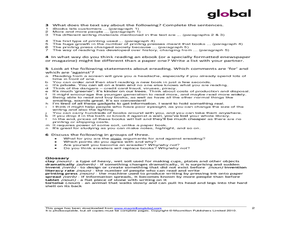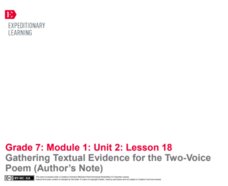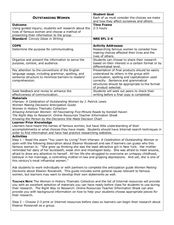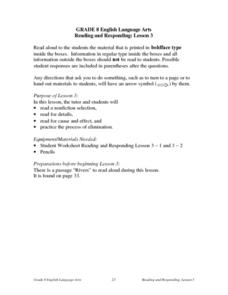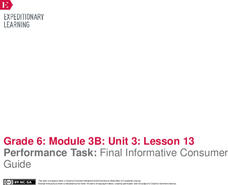EngageNY
Taking Notes Using a Graphic Organizer: Inferring About the Importance of Religion in Colonial America
Improve class understanding of colonial times by reading an informational text and filling out the accompanying graphic organizer. Class members work with a partner to read, take notes, make inferences, and synthesize information.The...
PBS
Analyzing Information - Can Pigs be Pets?
Engage your scholars in a discussion about pigs! Scholars analyze information about keeping pigs as pets and write a persuasive paragraph. An informational text and video are included for research. While examining these materials, class...
Curated OER
Joining Sentences
Sentence combining meets multiple objectives for writers, and they are all available in this informational text exercise. Learners read a mixed-up excerpt about the history of chess, putting 15 sentences into logical order. Have a...
Curated OER
What Was That All About?
Through direct instruction, the teacher demonstrates how to identify the main idea and supporting details of a text when creating a summary. As a class, read a paragraph, highlighting relevant information and crossing out extraneous...
Curated OER
Understanding Cause and Effect
Identify the author's organizational pattern for expressing ideas. After reading an article on the California Gold Rush, middle schoolers determine the author's purpose for writing a passage of informational text. A full list of...
Curated OER
Global News: The Changing Face of Reading
A current and engaging informational text with some superb scaffolding activities, this six paragraph article discusses the release of the iPad from Apple, eBooks, and the history of reading and writing materials. After reading the...
Curated OER
Glossaries
Explore text structure with a focus on the glossary feature in informational texts. Learners read a brief introduction before examining a glossary from a text about plants. They reference it while completing four comprehension questions....
New York State Education Department
English Language Arts Examination: January 2017
After reading literary and informational texts, scholars answer multiple-choice questions and write both a source-based argument and a text-analysis response.
EngageNY
End of Unit Assessment: Text-Dependent Questions and Draft Editorial: The Mary River Project on Baffin Island
Scholars complete an assessment, read an informational article, and answer text-based questions. Also, pupils use the Painted Essay technique to write a draft editorial about a topic they studied throughout the unit, the Mary River Mine...
EngageNY
Gathering Textual Evidence for the Two-Voice Poem (Author’s Note)
Writers take a look at how to gather evidence from the information text in the unit that connects to Salva and Nya’s story. They complete a Gathering Evidence from Informational Texts sheet to guide their work. Pupils then use the...
Curated OER
Outstanding Women
Research the lives of famous women in this social studies lesson. Middle schoolers use various sources to research a famous woman and create a presentation about the accomplishments of the woman. They can find the central idea throughout...
Curated OER
Gender in the Classroom by Deborah Tannen
Bring some informational text into your high school classroom with this worksheet. As your pupils read Gender in the Classroom by Deborah Tannen, provide them with this analysis sheet. They study specific quotations and sections of the...
National Council of Teachers of English
Timelines and Texts: Motivating Students to Read Nonfiction
With the emphasis on incorporating more nonfiction in language arts classes the question arises about how to design activities that motivate kids to engage with informational text. How about an assignment that asks class members to...
Curated OER
Budget Busters
Use this economic activity to focus on writing summaries of informational text. First, middle schoolers define common economic terms used to describe news about the economy. They closely read news about the federal budget deficit and...
Curated OER
Introduce Vocabulary: Are Trees Alive? (Miller)
Explore the life inside trees as scholars learn vocabulary through Debbie Miller's informational text Are Trees Alive? Familiarize pupils with the new words they will hear like anchor, disease, awaken, harsh, and swell before reading....
EngageNY
Mid-Unit Assessment: Analyzing an Author’s Argument and Text Structure
William Shakespeare: a writer, a poet, a fake? For their mid-unit assessments, scholars read an excerpt from the article "The Top Ten Reasons Shakespeare Did Not Write Shakespeare" by Keir Cutler. Next, they analyze the author's argument...
Curated OER
Reading and Responding: Lesson 3
Reinforce comprehension of informational text. This is a one-on-one instructional activity intended to build an internal dialogue the reader can use to boost overall comprehension. They work independently with a tutor or teacher to read...
K20 LEARN
Writing An Argumentative Paragraph: Argumentative Writing
Learning how to craft a cogent argument based on a solid claim, supported with evidence and solid reasoning, is an important life skill. Teach middle schoolers about argumentative writing with a lesson asking them to analyze the claims,...
EngageNY
Analyzing the Features of an Informative Consumer Guide
Analyze, strategize, synthesize! Scholars analyze informative consumer guides to determine what features to include in their own guides. Next, pupils select charts and images to use in their guides.
Curated OER
Validating Votes
Explore the discrepancies in Florida's vote counting process in 2000 and 2002 with this New York Times reading lesson. Middle schoolers study the viewpoints presented in informational text, paying attention to how word choice can...
T. Smith Publishing
Writing a Friendly Letter
Just because kids today are well-versed in texting and emails doesn't mean they shouldn't learn how to write a friendly letter! Reinforce their letter-writing skills with a lesson focused on the elements of a friendly letter, as well as...
EngageNY
Finding Relevant Information and Asking Research Questions: The Big Thirst
Let's get to the gist. As scholars continue their study of Charles Fishman's The Big Thirst, they practice writing the gist of the text. Additionally, pupils add notes about the industrial uses of water to their researcher's notebooks.
EngageNY
Performance Task: Final Informative Consumer Guide
Formative feedback should be kind, specific, and helpful. Pupils engage in a peer editing process, using a rubric to critique a partner's writing. Next, scholars use the feedback to create the final version of their informative consumer...
EngageNY
Research: Close Read of Text 3 for Each Expert Group
How do athletes break barriers? Pupils consider the question as they continue looking for evidence to support their opinions about how their chosen athlete created a legacy. In small groups, they read an informative article about either...







